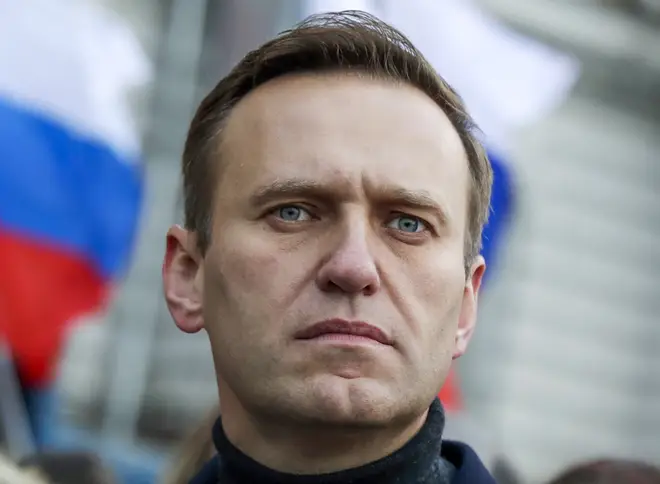
Oli Dugmore 4am - 7am
7 September 2020, 17:04 | Updated: 7 September 2020, 17:24

The Russian Ambassador to the UK has been summoned to the Foreign Office over the poisoning of opposition politician Alexei Navalny.
In a statement, the Foreign, Commonwealth and Development Office said the Government had "deep concern" over Mr Navalny's poisoning, which is believed to have been carried out using Novichok.
Foreign Secretary Dominic Raab said it was "completely unacceptable that a banned chemical weapon has been used and Russia must hold a full, transparent investigation."
The Kremlin critic, 44, fell ill on a flight to Moscow and had been in an induced coma since 22 August.
But earlier on Monday, it was revealed he was out of the coma and "responding to speech" in a Berlin hospital.
1/2 Today the UK summoned Russia’s Ambassador to the UK to register deep concern about the poisoning of Alexey @Navalny. It’s completely unacceptable that a banned chemical weapon has been used and Russia must hold a full, transparent investigation
— Dominic Raab (@DominicRaab) September 7, 2020
Mr Raab said he was "relieved" that Mr Navalny's condition had improved.
He tweeted: "Today the UK summoned Russia's Ambassador to the UK to register deep concern about the poisoning of Alexey @navalny. It's completely unacceptable that a banned chemical weapon has been used and Russia must hold a full, transparent investigation.
"Relieved to hear that Alexei Navalny has been taken out of the medically induced coma. I hope his condition continues to improve."
A Foreign, Commonwealth and Development Office spokesperson said: “Today the Russian Ambassador to the UK was summoned to the Foreign, Commonwealth and Development Office.
"The UK Government registered its deep concern with the Russian Government about the poisoning of Alexey Navalny with a chemical nerve agent from the Novichok group.

"Russia will lie and lie and lie" - MP on Alexei Navalny poisoning
“The Foreign Secretary has made it clear that it is absolutely unacceptable that a banned chemical weapon has been used, and that violence has again been directed against a leading Russian opposition figure.
"There is a case here for Russia to answer. This took place on Russian soil, against a Russian citizen.
"They have international obligations to uphold. This is nothing short of an attack against the rules based international system which keeps our societies safe.
“Russia needs to conduct a full, transparent criminal investigation into Mr Navalny’s poisoning. We will work with our partners, including through action in the OPCW, to hold the perpetrators to account.”
Russia has denied that the Kremlin was involved in poisoning Mr Navalny.
But there is increasing pressure for Mr Putin to explain how his critic fell seriously ill, allegedly with the same chemical weapon used against Sergei Skripal, the Russian former double agent targeted in Wiltshire in 2018.
Berlin has threatened to rethink the fate of a German-Russian gas pipeline project if Moscow does not support an investigation, and Mr Raab has been in contact with his German counterpart Heiko Maas.
In response to the Skripal attack, Boris Johnson, as foreign secretary, helped corral a wave of expulsions of Russian diplomats across the EU and US after Britain told 23 envoys to leave.
Mr Skripal and his daughter Yulia were two of five people exposed to the substance, both spending weeks in hospital recovering.
But Dawn Sturgess, 44, of Amesbury, Wiltshire, died in July that year after coming into contact with a perfume bottle thought to originally contain the poison, while her partner, Charlie Rowley, spent nearly three weeks in hospital.